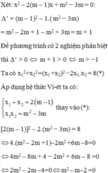Cho bt: x2-3x-m2+m+1=0. Tìm m để pt có 2 nghiệm x1, x2 thỏa mãn: 3x1+x22 +6=8m
Hãy nhập câu hỏi của bạn vào đây, nếu là tài khoản VIP, bạn sẽ được ưu tiên trả lời.


\(\Delta'=\left(m+4\right)^2-\left(m^2+8m+15\right)=1>0\Rightarrow\) pt luôn có 2 nghiệm pb với mọi m
Do \(x_1< x_2\Rightarrow\left\{{}\begin{matrix}x_1=m+4-1=m+3\\x_2=m+4+1=m+5\end{matrix}\right.\)
\(3x_1-2x_2=15\)
\(\Leftrightarrow3\left(m+3\right)-2\left(m+5\right)=15\)
\(\Leftrightarrow m=16\)

\(x^2+2\left(m+1\right)+4m-4=0\)
Theo Vi - ét, ta có :
\(\left\{{}\begin{matrix}x_1+x_2=-\dfrac{b}{a}=-2\left(m+1\right)\\x_1x_2=\dfrac{c}{a}=4m-4\end{matrix}\right.\)
Ta có :
\(x_1^2+x_2^2+3x_1x_2=0\)
\(\Leftrightarrow\left(x_1+x_2\right)^2-2x_1x_2+3x_1x_2=0\)
\(\Leftrightarrow\left(x_1+x_2\right)^2+x_1x_2=0\)
\(\Leftrightarrow\left[-2\left(m+1\right)\right]^2+\left(4m-4\right)=0\)
\(\Leftrightarrow4\left(m^2+2m+1\right)+4m-4=0\)
\(\Leftrightarrow4m^2+8m+4+4m-4=0\)
\(\Leftrightarrow4m^2+12m=0\)
\(\Leftrightarrow4m\left(m+3\right)=0\)
\(\Leftrightarrow\left[{}\begin{matrix}m=0\\m=-3\end{matrix}\right.\)

\(x^2-2x-m^2+m-4=0\left(1\right)\)
Để phương trình (1) có 2 nghiệm phân biệt thì:
\(\Delta>0\Rightarrow\left(-2\right)^2-4.\left(-m^2+m-4\right)>0\)
\(\Rightarrow4+4m^2-4m+16>0\)
\(\Leftrightarrow\left(2m-1\right)^2+19>0\) (luôn đúng)
Vậy với \(\forall m\) thì phương trình (1) luôn có 2 nghiệm phân biệt.
Theo định lí Viete cho phương trình (1) ta có:
\(\left\{{}\begin{matrix}x_1+x_2=-2\\x_1x_2=-m^2+m-4\end{matrix}\right.\)
Ta có: \(\left|3x_1\right|-\left|x_2\right|=6\left(2\right)\)
Ta thấy:\(-m^2+m-4=-\left(m^2-m+\dfrac{1}{4}\right)-\dfrac{15}{4}=-\left(m-\dfrac{1}{2}\right)^2-\dfrac{15}{4}\le-\dfrac{15}{4}< 0\)
\(\Rightarrow-m^2+m-4< 0\) hay \(x_1x_2< 0\). Do đó x1, x2 phải trái dấu.
Ta xét 2 trường hợp:
TH1, x1>0 , x2<0. Khi đó:
\(\left(2\right)\Rightarrow3x_1+x_2=6\)
\(\Rightarrow\left(x_1+x_2\right)-6=-2x_1\left(1'\right)\) và \(3\left(x_1+x_2\right)-6=2x_2\left(2'\right)\)
Lấy (1') nhân cho (2') ta được:
\(\left[\left(x_1+x_2\right)-6\right]\left[3\left(x_1+x_2\right)-6\right]=-4x_1x_2\)
\(\Rightarrow\left(-2-6\right)\left[3.\left(-2\right)-6\right]=-4\left(-m^2+m-4\right)\)
\(\Leftrightarrow-m^2+m-4=-24\)
\(\Leftrightarrow m^2-m+4=24\)
\(\Leftrightarrow m^2-m-20=0\)
\(\Leftrightarrow\left[{}\begin{matrix}m=5\\m=-4\end{matrix}\right.\)
TH2: x1<0 ; x2>0. Khi đó:
\(\left(2\right)\Rightarrow3x_1+x_2=-6\)
\(\Rightarrow\left(x_1+x_2\right)+6=-2x_1\left(3'\right)\) và \(3\left(x_1+x_2\right)+6=2x_2\left(4'\right)\)
Lấy (3') nhân cho (4') ta được:
\(\left[\left(x_1+x_2\right)+6\right]\left[3\left(x_1+x_2\right)+6\right]=-4x_1x_2\)
\(\Rightarrow\left(-2+6\right)\left[3.\left(-2\right)+6\right]=-4\left(-m^2+m-4\right)\)
\(\Rightarrow m^2-m+4=0\) (phương trình vô nghiệm)
Thử lại ta có \(\left[{}\begin{matrix}m=5\\m=-4\end{matrix}\right.\)

Bài 1:
a, Thay m=-1 vào (1) ta có:
\(x^2-2\left(-1+1\right)x+\left(-1\right)^2+7=0\\
\Leftrightarrow x^2+1+7=0\\
\Leftrightarrow x^2+8=0\left(vô.lí\right)\)
Thay m=3 vào (1) ta có:
\(x^2-2\left(3+1\right)x+3^2+7=0\\ \Leftrightarrow x^2-2.4x+9+7=0\\ \Leftrightarrow x^2-8x+16=0\\ \Leftrightarrow\left(x-4\right)^2=0\\ \Leftrightarrow x-4=0\\ \Leftrightarrow x=4\)
b, Thay x=4 vào (1) ta có:
\(4^2-2\left(m+1\right).4+m^2+7=0\\ \Leftrightarrow16-8\left(m+1\right)+m^2+7=0\\ \Leftrightarrow m^2+23-8m-8=0\\ \Leftrightarrow m^2-8m+15=0\\ \Leftrightarrow\left(m^2-3m\right)-\left(5m-15\right)=0\\ \Leftrightarrow m\left(m-3\right)-5\left(m-3\right)=0\\ \Leftrightarrow\left(m-3\right)\left(m-5\right)=0\\ \Leftrightarrow\left[{}\begin{matrix}m=3\\m=5\end{matrix}\right.\)
c, \(\Delta'=\left[-\left(m+1\right)\right]^2-\left(m^2+7\right)=m^2+2m+1-m^2-7=2m-6\)
Để pt có 2 nghiệm thì \(\Delta'\ge0\Leftrightarrow2m-6\ge0\Leftrightarrow m\ge3\)
Theo Vi-ét:\(\left\{{}\begin{matrix}x_1+x_2=2m+2\\x_1x_2=m^2+7\end{matrix}\right.\)
\(x_1^2+x_2^2=0\\ \Leftrightarrow\left(x_1+x_2\right)^2-2x_1x_2=0\\ \Leftrightarrow\left(2m+2\right)^2-2\left(m^2+7\right)=0\\ \Leftrightarrow4m^2+8m+4-2m^2-14=0\\ \Leftrightarrow2m^2+8m-10=0\\ \Leftrightarrow\left[{}\begin{matrix}m=1\left(ktm\right)\\m=-5\left(ktm\right)\end{matrix}\right.\)
\(x_1-x_2=0\\ \Leftrightarrow\left(x_1-x_2\right)^2=0\\ \Leftrightarrow\left(x_1+x_2\right)^2-4x_1x_2=0\\ \Leftrightarrow\left(2m+2\right)^2-4\left(m^2+7\right)=0\\ \Leftrightarrow4m^2+8m+4-4m^2-28=0\\ \Leftrightarrow8m=28=0\\ \Leftrightarrow m=\dfrac{7}{2}\left(tm\right)\)
Bài 2:
a,Thay m=-2 vào (1) ta có:
\(x^2-2x-\left(-2\right)^2-4=0\\ \Leftrightarrow x^2-2x-4-4=0\\ \Leftrightarrow x^2-2x-8=0\\ \Leftrightarrow\left[{}\begin{matrix}x=4\\x=-2\end{matrix}\right.\)
b, \(\Delta'=\left(-m\right)^2-\left(-m^2-4\right)\ge0=m^2+m^2+4=2m^2+4>0\)
Suy ra pt luôn có 2 nghiệm phân biệt
Theo Vi-ét:\(\left\{{}\begin{matrix}x_1+x_2=2\\x_1x_2=-m^2-4\end{matrix}\right.\)
\(x_1^2+x_2^2=20\\ \Leftrightarrow\left(x_1+x_2\right)^2-2x_1x_2=20\\ \Leftrightarrow2^2-2\left(-m^2-4\right)=20\\ \Leftrightarrow4+2m^2+8-20=0\\ \Leftrightarrow2m^2-8=0\\ \Leftrightarrow m=\pm2\)
\(x_1^3+x_2^3=56\\ \Leftrightarrow\left(x_1+x_2\right)^3-3x_1x_2\left(x_1+x_2\right)=56\\ \Leftrightarrow2^3-3\left(-m^2-4\right).2=56\\ \Leftrightarrow8-6\left(-m^2-4\right)-56\\ =0\\ \Leftrightarrow8+6m^2+24-56=0\\ \Leftrightarrow6m^2-24=0\\ \Leftrightarrow m=\pm2\)
\(x_1-x_2=10\\ \Leftrightarrow\left(x_1-x_2\right)^2=100\\ \Leftrightarrow\left(x_1+x_2\right)^2-4x_1x_2-100=0\\ \Leftrightarrow2^2-4\left(-m^2-4\right)-100=0\\ \Leftrightarrow4+4m^2+16-100=0\\ \Leftrightarrow4m^2-80=0\\ \Leftrightarrow m=\pm2\sqrt{5}\)

\(\Delta=9-4\left(-m^2+m+2\right)=4m^2-4m+1=\left(2m-1\right)^2\)
Pt có 2 nghiệm pb khi \(m\ne\dfrac{1}{2}\)
Do vai trò của 2 nghiệm là như nhau, giả sử: \(\left\{{}\begin{matrix}x_1=\dfrac{3-\left(2m-1\right)}{2}=2-m\\x_2=\dfrac{3+2m-1}{2}=m+1\end{matrix}\right.\)
\(x_1^2+x_2^2=5\Leftrightarrow\left(2-m\right)^2+\left(m+1\right)^2=5\)
\(\Leftrightarrow m^2-m=0\Rightarrow\left[{}\begin{matrix}m=0\\m=1\end{matrix}\right.\)

Lời giải:
Để PT có 2 nghiệm $x_1,x_2$ thì:
$\Delta'=(m+1)^2-(m^2-1)>0\Leftrightarrow 2m+2>0\Leftrightarrow m>-1$
Áp dụng định lý Viet:
$x_1+x_2=2(m+1)$ và $x_1x_2=m^2-1$
Khi đó, để $x_1^2+x_2^2=x_1x_2+8$
$\Leftrightarrow (x_1+x_2)^2-2x_1x_2=x_1x_2+8$
$\Leftrightarrow (x_1+x_2)^2=3x_1x_2+8$
$\Leftrightarrow 4(m+1)^2=3(m^2-1)+8$
$\Leftrightarrow m^2+8m-1=0$
$\Leftrightarrow m=-4\pm \sqrt{17}$. Vì $m>-1$ nên $m=-4+\sqrt{17}$

Δ=(-4)^2-4(m^2+3m)
=16-4m^2-12m
=-4(m^2+3m-4)
=-4(m+4)(m-1)
Để phươg trình có hai nghiệm thì Δ>=0
=>-4(m+4)(m-1)>=0
=>(m+4)(m-1)<=0
=>-4<=m<=1
x1^2+x2^2=6
=>(x1+x2)^2-2x1x2=6
=>4^2-2(m^2+3m)=6
=>16-2m^2-6m-6=0
=>-2m^2-6m+10=0
=>m^2+3m-5=0
=>\(m=\dfrac{-3\pm\sqrt{29}}{2}\)
\(\Delta'=4-m^2-3m\ge0\Rightarrow-4\le m\le1\)
Theo hệ thức Viet: \(\left\{{}\begin{matrix}x_1+x_2=4\\x_1x_2=m^2+3m\end{matrix}\right.\)
\(x_1^2+x_2^2=6\Leftrightarrow\left(x_1+x_2\right)^2-2x_1x_2=6\)
\(\Leftrightarrow4^2-2\left(m^2+3m\right)=6\)
\(\Leftrightarrow m^2+3m-5=0\Rightarrow\left[{}\begin{matrix}m=\dfrac{-3+\sqrt{29}}{2}>1\left(loại\right)\\m=\dfrac{-3-\sqrt{29}}{2}< -4\left(loại\right)\end{matrix}\right.\)
Vậy ko tồn tại m thỏa mãn yêu cầu đề bài

